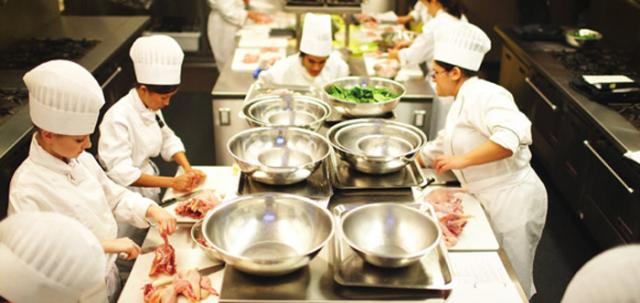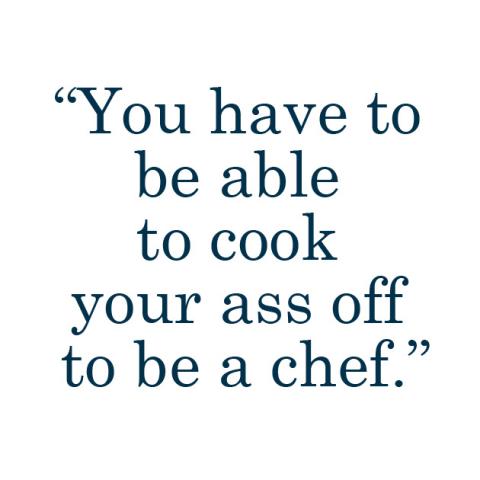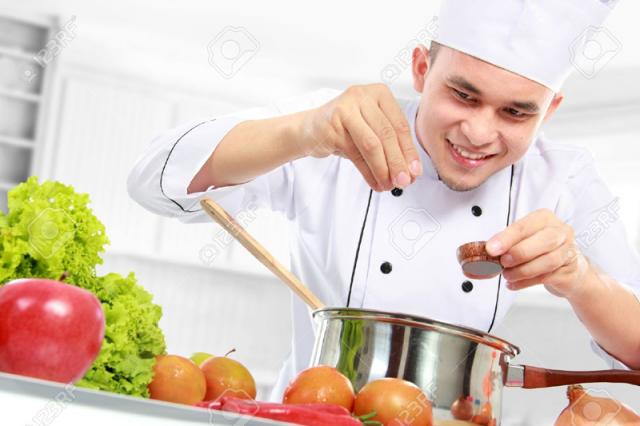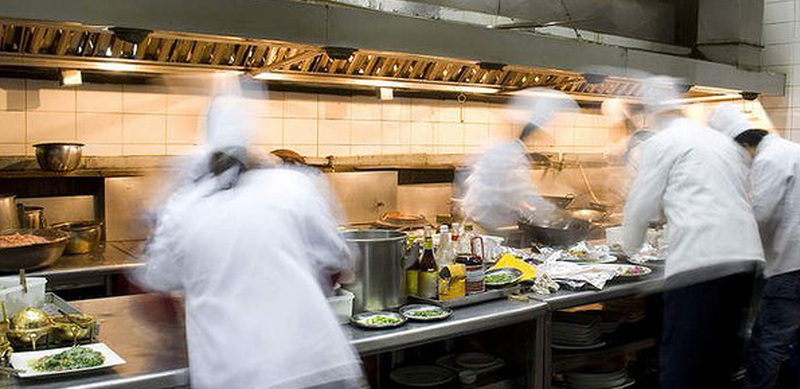I’ve always had difficulty explaining to friends and family the way in which a smooth, well run kitchen actually operates — there’s a lot of moving parts, and it’s a thing of beauty to watch your team power through a weekend night in such organized chaos. From a distance, I suppose the average restaurant kitchen looks like a bunch of folks doing the same exact thing, almost like an assembly line, but if you actually pay attention, you see that everything is pieced together a certain way for a reason.
 You have to be able to cook your ass off to be a chef, but just because you can doesn’t mean that you are one. Like most starting out, I was pretty average when I started working in the kitchen, and over time I got better to the point where I got to be pretty good, and now I’d call myself a great cook… and a chef. Notice, how becoming a chef doesn’t graduate you from being a cook, instead, it compliments it and is part of the repertoire.
You have to be able to cook your ass off to be a chef, but just because you can doesn’t mean that you are one. Like most starting out, I was pretty average when I started working in the kitchen, and over time I got better to the point where I got to be pretty good, and now I’d call myself a great cook… and a chef. Notice, how becoming a chef doesn’t graduate you from being a cook, instead, it compliments it and is part of the repertoire.
So, the real question is — how does a great cook become a chef?
I think a chef is someone who can cook their face off, while at the same time, having the ability to manage, lead and create a successful kitchen operation — restaurant or otherwise. One of the main problems is that the hands on, technical part of the job, which most of us enjoy most, requires a drastically different skill set than the other essential components of the job. So, yes, there are obvious hands on skills and techniques required, but a whole host of others, as well.
Chefs are different than just about every other creative professional, because of the fact that to express our creative vision, we have to manage and put so many other entities in place. We are unlike other artists whose work directly links back to the work they create — a writer, writes — a painter — paints, and an actor — acts. We have a slew of variables that are ever changing that affect what we put out that arr essential to properly manage. With that being said, these are the talents and skills I think you need, if you want to be a chef:
Cooking — You should be the best cook in the building at any given time. If your line cooks or sous chefs have questions or are unsure about a technique, you need to be there to help them along. This doesn’t mean you have all the answers, but you’ll certainly uncover more the longer you spend in the kitchen, honing your craft. Until you master the technical craft of cooking in heated, tense and stressful situations, no one, not even your staff will take you seriously.
Vision — One of the most important things an artist does is see things that don’t yet exist, and finds ways to bring them to life — that’s what we do through our food, our menus and our restaurants. Having a vision can be scary though, because we must then put ourselves out there, and act on that vision. It’s scary, because we don’t know how our customers, bosses and employees will respond. Regardless, this is what makes us artists, and part of what gives people a reason to believe in us, but to do so takes clearly articulating that vision so one’s team has a clear view of where they are going.
Knowing The Numbers — If you can’t cost a dish out in your head within fifteen to twenty seconds — you aren’t a chef. I truly believe that. This indicates that you clearly haven’t spent enough time costing out menus, mastering recipes and plating dishes. You need to know how much each plate of food costs, so that you can then price out a menu. But, that’s only part of the numbers — you need to be able to standardize recipes, cost out labor, manage inventory, try to cut back on inventory when times are tight, and the list goes on and on.
Systematic — Most cooks are I think, by nature, disorganized and cluttered as hell, allowing for our ADD side to often get the best of us. Over time though, we realize that to become a better cook, we have to organize our time and stations better. We have to create recipes and processes that put our teams in the best position to succeed. You need to always be looking to make things more efficient and more productive without sacrificing quality.
Able To Develop Emotional Intelligence — We’ve all talked about the notion that chefs are straight assholes in the kitchen, and there are certainly some of those still around, but the more our industry and profession becomes a sought after form of expressing one’s self, the more this personae seems to fade away. I think this is a really good thing. As chefs and managers, we need to be able to manage people, make them feel appreciated and valued for the job they do, and most importantly prove through our actions, that we have their back and support them. To be a successful chef, you need to be able to relate to the people around you, the ones you depend, because if you can’t they won’t ever truly relate to or feel like they are a part of what you’re building — that’s critical.
 Lead your team, recognize your staff when appropriate, discipline when necessary, give them a chance to make mistakes, and when they do make mistakes, handle it in a way that allows for them to learn and grow as a cook and a person, versus the exact opposite (which happens a lot). A chef can have everything else in place, but if he or she doesn’t have a solid, dependable group of people rallying behind their mission every day, they have nothing.
Lead your team, recognize your staff when appropriate, discipline when necessary, give them a chance to make mistakes, and when they do make mistakes, handle it in a way that allows for them to learn and grow as a cook and a person, versus the exact opposite (which happens a lot). A chef can have everything else in place, but if he or she doesn’t have a solid, dependable group of people rallying behind their mission every day, they have nothing.
Disciplined — (Standard for Excellence) — Everything starts at the top. Most cooks aren’t ready to become chefs because they don’t know how to set the standard. From company culture, to cleanliness, to customer service, to plate presentation, it all starts with the chef. Why do some restaurants have such poor standards for the product that leaves the kitchen? Maybe it started that way, or perhaps it’s evolved over time, regardless, every single day, multiple people allow for an unappetizing plate of food to leave the kitchen. As coach John Wooden used to say, “if you don’t have time to do it right, when will you have time to do it over?”
Hardest Working Person in the Building — Of all the ways to prove you want something in life, nothing says it more than
hustling your ass off doing something meaningful to you, and that’s exactly what the great chefs around the world. They are the first person to walk in the door in the morning, and often one of the last to leave. Plain and simple, if you want it, you’ve gotta put in the work.
A Point of View — I saved this for the end, because it truly does take time and labor hours spent working on the craft to truly develop a voice that’s yours, and that says, “this is who I am”, and as chefs, we need to be able to do that. It takes learning from and working for other people, in order to really figure out what types of cuisines, flavors and styles make us tick and speak about who I am and want to be.
I feel that each stint working on different concepts and ideas gives food the chance to pave the way towards who you are continually becoming, and you start creating a point of view. I definitely don’t think that’s something you know at twenty, or maybe even thirty — I think you’ve just got to pay attention to the work your doing, and every now and then, try to step back and listen closely to what your heart has to say, and say to yourself,
“I want to do this — this is who I am.”
So at what point do you become a chef? I think, you just kind of know and can feel it — it certainly helps having a list of things to work towards that’ll move you closer to making that a reality. I hope this helps.
 Chef Chris Hill left a job in the business world to follow his heart and passion into the world of cooking and the kitchen. Chris opened his first restaurant at 28 and grew into the role of executive chef.
Chef Chris Hill left a job in the business world to follow his heart and passion into the world of cooking and the kitchen. Chris opened his first restaurant at 28 and grew into the role of executive chef.
Having taken his experiences in the corporate world, as well as those in the kitchen, Chris has built a large social media following centered around TV appearances all over the Southeast U.S., his writing, TEDx talks, and his mission of helping industry workers to lead fulfilling, successful careers.
Chris' first book comes out in the Summer of 2016 and is a dive into what makes for a successful career in the restaurant world, and includes exclusive interviews with some of the world's leading and most respected chefs.
You can follow Chris on Facebook, Twitter and Instagram, and read more of his work here.


 You have to be able to cook your ass off to be a chef, but just because you can doesn’t mean that you are one. Like most starting out, I was pretty average when I started working in the kitchen, and over time I got better to the point where I got to be pretty good, and now I’d call myself a great cook… and a chef. Notice, how becoming a chef doesn’t graduate you from being a cook, instead, it compliments it and is part of the repertoire.
You have to be able to cook your ass off to be a chef, but just because you can doesn’t mean that you are one. Like most starting out, I was pretty average when I started working in the kitchen, and over time I got better to the point where I got to be pretty good, and now I’d call myself a great cook… and a chef. Notice, how becoming a chef doesn’t graduate you from being a cook, instead, it compliments it and is part of the repertoire.
 Lead your team, recognize your staff when appropriate, discipline when necessary, give them a chance to make mistakes, and when they do make mistakes, handle it in a way that allows for them to learn and grow as a cook and a person, versus the exact opposite (which happens a lot). A chef can have everything else in place, but if he or she doesn’t have a solid, dependable group of people rallying behind their mission every day, they have nothing.
Lead your team, recognize your staff when appropriate, discipline when necessary, give them a chance to make mistakes, and when they do make mistakes, handle it in a way that allows for them to learn and grow as a cook and a person, versus the exact opposite (which happens a lot). A chef can have everything else in place, but if he or she doesn’t have a solid, dependable group of people rallying behind their mission every day, they have nothing.
 Chef Chris Hill left a job in the business world to follow his heart and passion into the world of cooking and the kitchen. Chris opened his first restaurant at 28 and grew into the role of executive chef.
Chef Chris Hill left a job in the business world to follow his heart and passion into the world of cooking and the kitchen. Chris opened his first restaurant at 28 and grew into the role of executive chef.









